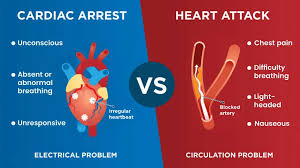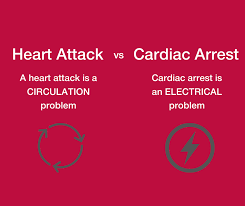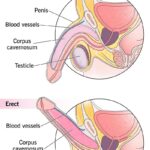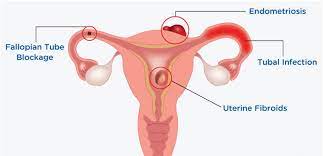Heart Attack vs. Cardiac Arrest: Key Differences

When it comes to heart-related emergencies, many people confuse heart attack and cardiac arrest—but they are not the same. Understanding the difference can save lives. Both conditions are medical emergencies, but they affect the heart in different ways and require distinct treatments.
In this article, we’ll break down the differences between a heart attack and cardiac arrest, their causes, symptoms, risk factors, prevention tips, and what to do in an emergency.
What is a Heart Attack?
A heart attack (medically called myocardial infarction) occurs when blood flow to part of the heart muscle is blocked, usually by a blood clot or plaque buildup in the coronary arteries. Without oxygen-rich blood, part of the heart muscle begins to die.
Symptoms of a Heart Attack
-
Chest pain or pressure (often described as “squeezing” or “crushing”)
-
Pain radiating to the arm, back, neck, or jaw
-
Shortness of breath
-
Nausea or vomiting
-
Sweating (cold sweat)
-
Lightheadedness or dizziness
Note: Symptoms can differ between men and women. Women are more likely to experience fatigue, shortness of breath, and nausea rather than classic chest pain.
What is Cardiac Arrest?
A cardiac arrest occurs when the heart suddenly stops beating due to an electrical malfunction. This leads to the brain and vital organs not receiving oxygenated blood.
Symptoms of Cardiac Arrest
-
Sudden collapse
-
Loss of consciousness
-
No pulse
-
No breathing
Without immediate intervention (CPR and defibrillation), death can occur within minutes.
Heart Attack vs. Cardiac Arrest: Key Differences

| Feature | Heart Attack | Cardiac Arrest |
|---|---|---|
| Cause | Blocked blood flow in coronary arteries | Electrical malfunction in the heart |
| Effect on Heart | Part of heart muscle is damaged | Heart stops beating suddenly |
| Onset | Gradual, symptoms may build over hours or days | Sudden, often without warning |
| Consciousness | Usually conscious (may lose consciousness if untreated) | Immediate loss of consciousness |
| Treatment | Medications, angioplasty, stents, lifestyle change | Immediate CPR, defibrillator, advanced medical care |
How Are They Related?
-
A heart attack can trigger cardiac arrest if the damaged heart muscle disrupts the heart’s electrical system.
-
However, cardiac arrest can also occur due to other conditions like arrhythmias, heart failure, or even trauma.
Risk Factors for Both
-
High blood pressure (hypertension)
-
High cholesterol
-
Diabetes
-
Smoking
-
Obesity
-
Sedentary lifestyle
-
Family history of heart disease
-
Stress and poor diet
Emergency Response: What to Do
If Someone is Having a Heart Attack:
-
Call emergency services immediately.
-
Keep the person calm and seated.
-
If available, give aspirin (unless allergic).
-
Use prescribed nitroglycerin if the patient has it.
If Someone Suffers a Cardiac Arrest:
-
Call emergency services.
-
Start CPR immediately (push hard and fast in the center of the chest).
-
Use an AED (Automated External Defibrillator) if available.
-
Continue until professional help arrives.
Prevention Tips
-
Eat a heart-healthy diet (low in saturated fats, rich in fruits, vegetables, whole grains).
-
Exercise regularly (at least 150 minutes of moderate activity weekly).
-
Stop smoking and limit alcohol intake.
-
Manage stress with meditation, yoga, or relaxation techniques.
-
Control diabetes, cholesterol, and blood pressure.
-
Get regular check-ups with your doctor.
Final Thoughts
While heart attack and cardiac arrest are often used interchangeably, they are distinct conditions with different causes and treatments. Recognizing the difference can help you respond appropriately in an emergency and even save a life.
Taking preventive measures—through healthy lifestyle habits, regular screenings, and prompt medical care—can significantly reduce your risk of both conditions.
👉 If you or a loved one is living with risk factors like diabetes, hypertension, or high cholesterol, speak with a today. Early intervention is key to protecting your heart health.
Written by Fawzi Rufai, Medically Reviewed by Sesan Kareem



